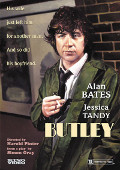
Directed by
Harold Pinter
129 minutes
Rated M
Reviewed by
Bernard Hemingway

Butley
Watching Alan Bates’ Ben Butley, a minor tenured academic in the English Department of Queen Mary’s College, London, one can’t help but think of Richard Burton’s George in Who’s Afraid of Virginia Woolf?(1968). The two men are cut from the same cloth. Aside from the similarity between the two self-loathing, alcoholic academics bitterly resigned to their failed careers we are treated to the same kind of excoriating wit and verbal fireworks as Butley goes about mocking and/or offending everyone with whom he comes into contact.
Dirived form a hit stage play by Simon Grey, the film is directed for the American Film Theater by celebrated English playwright Harold Pinter helming his only feature film as a director. Pinter keeps a stage-like setting with, most of the action taking place in Butley’s office which he shares with a younger colleague who was once Butley’s protégé. Various people come to see him (including Jessica Tandy as a fellow academic), all of whom Butley, almost despite himself, sets about insulting, his judgement increasingly clouded by booze and his natural ill-temper aggravated by his recent separation from his wife who is leaving him for another man. Once aspiring to be a specialist on T.S. Eliot, he now finds comfort in the simplicitudes of Beatrix Potter, from whom he periodically quotes in order to needle his victims.
Unfortunately there isn’t a character equivalent to Albee’s Martha, let alone the young couple who unwisely visit the older couple and as a result Simon Gray’s play (and screenplay) has a smaller range and thus seems at time perhaps a little too nasty (particularly with respect to Butley’s contempt for women and homosexuals). It falls to Alan Bates who reprises the role he played on the London stage to create the leavening pathos, something which he does well. Although aside from his failed marriage we get very little background on Butley, we do get a sense of the man’s estrangement, a keen awareness of promise unfulfilled and failure keenly felt, an awareness which is deflected with savage sarcasm that masks a desperate need for companionship of some kind. Butley is ultimately a sad and lonely man.
Butley is not something everyone will find compelling viewing but for anyone who enjoys tip-top theatre and dazzling writing Butley is well worth seeking out.
Want something different?





